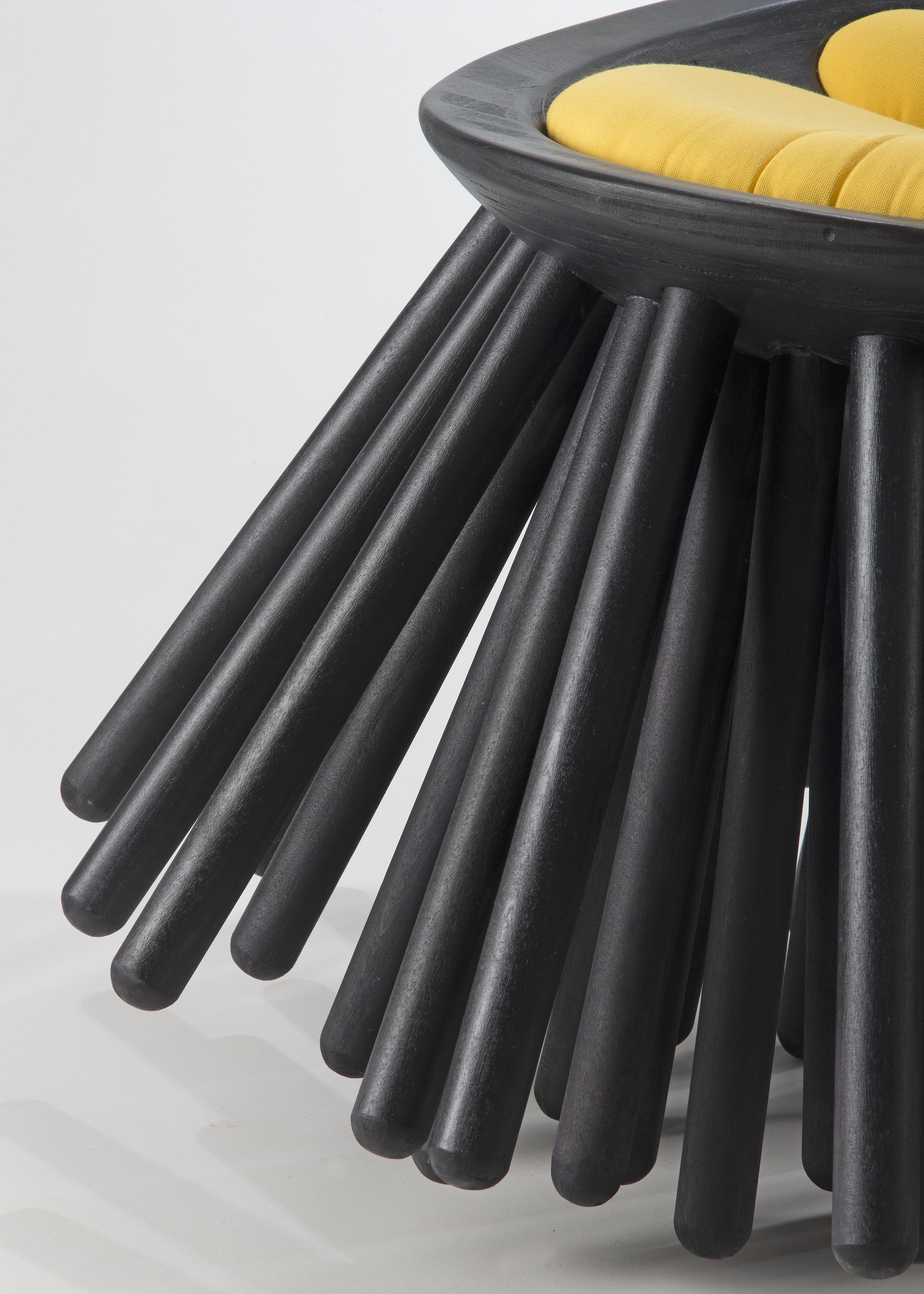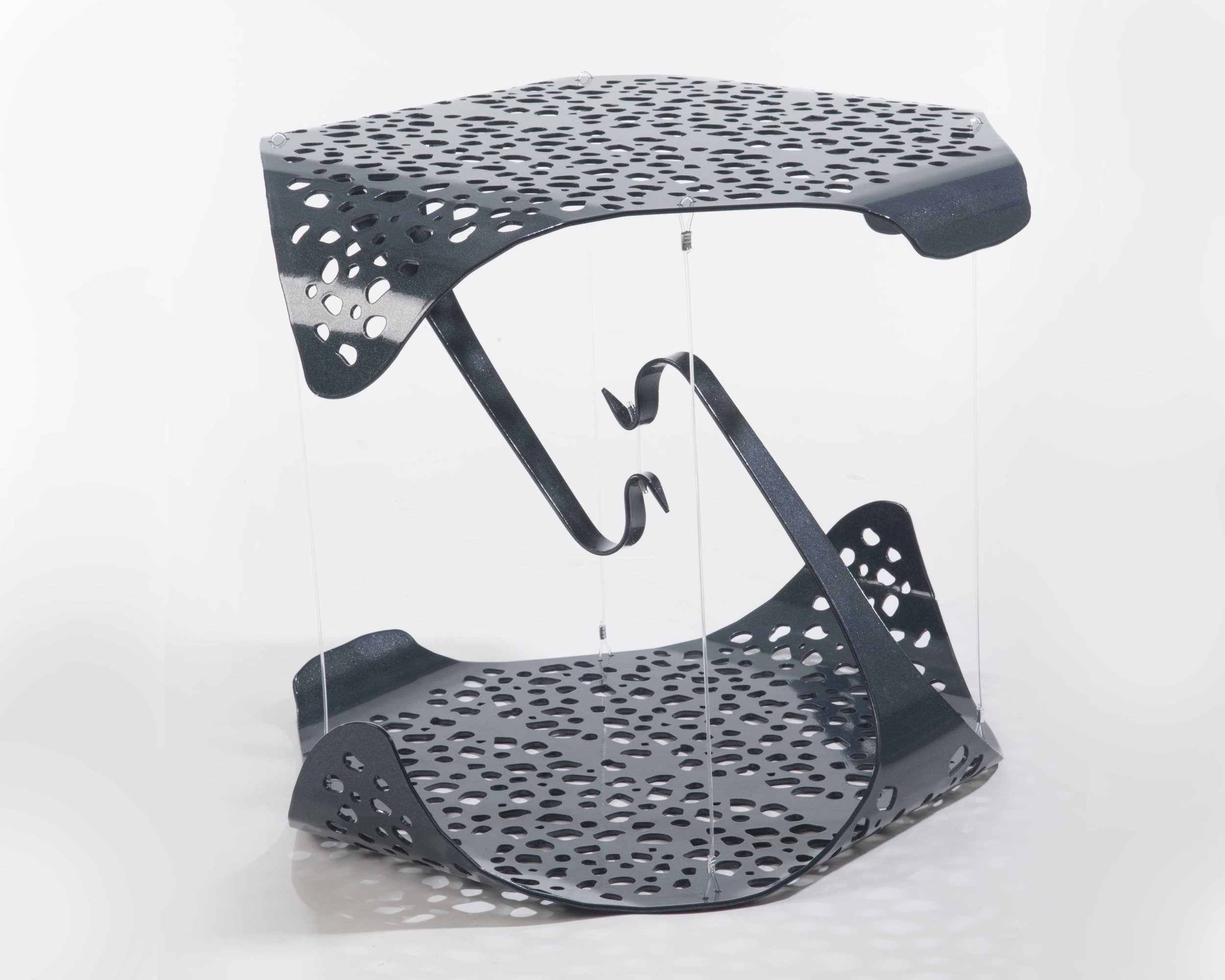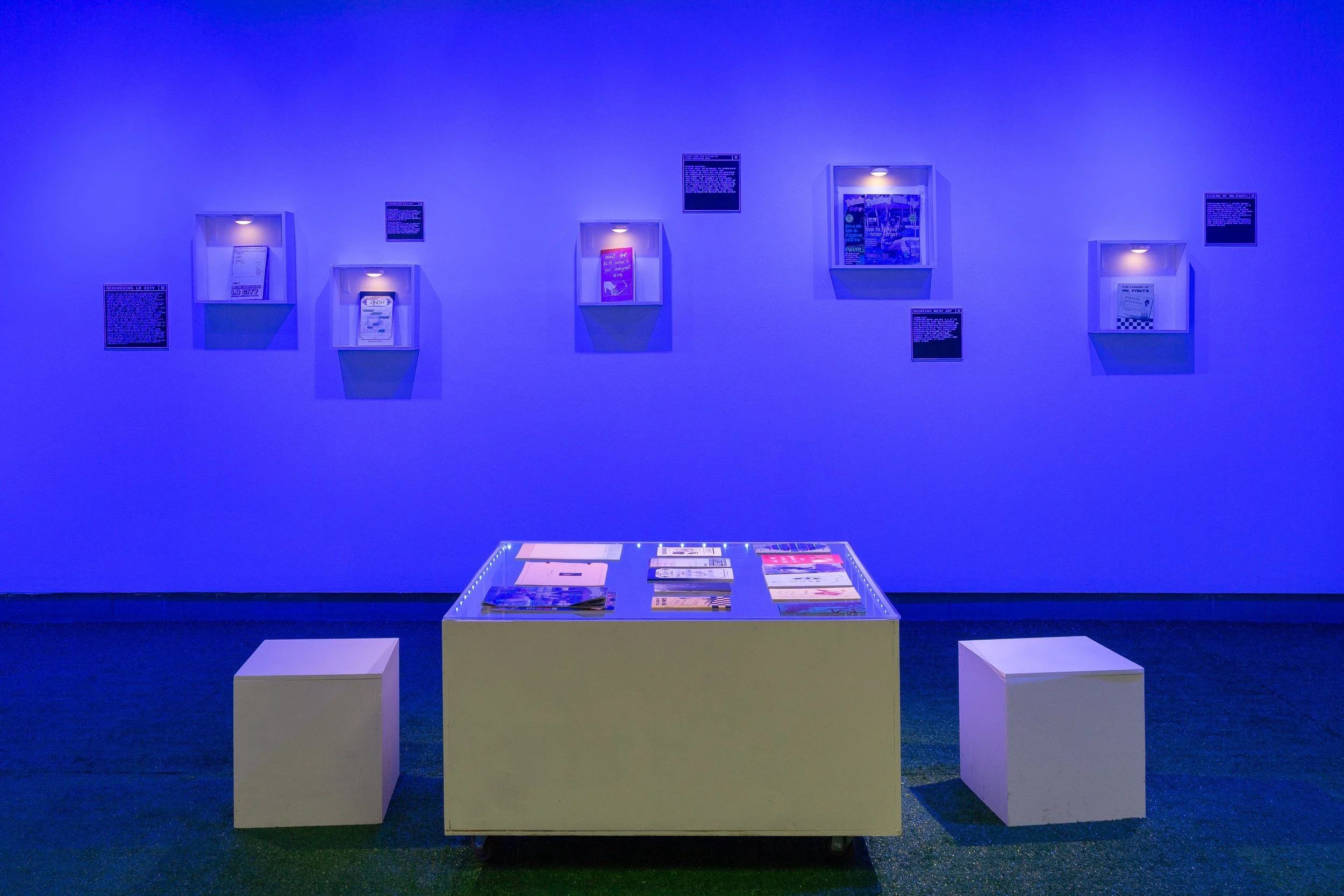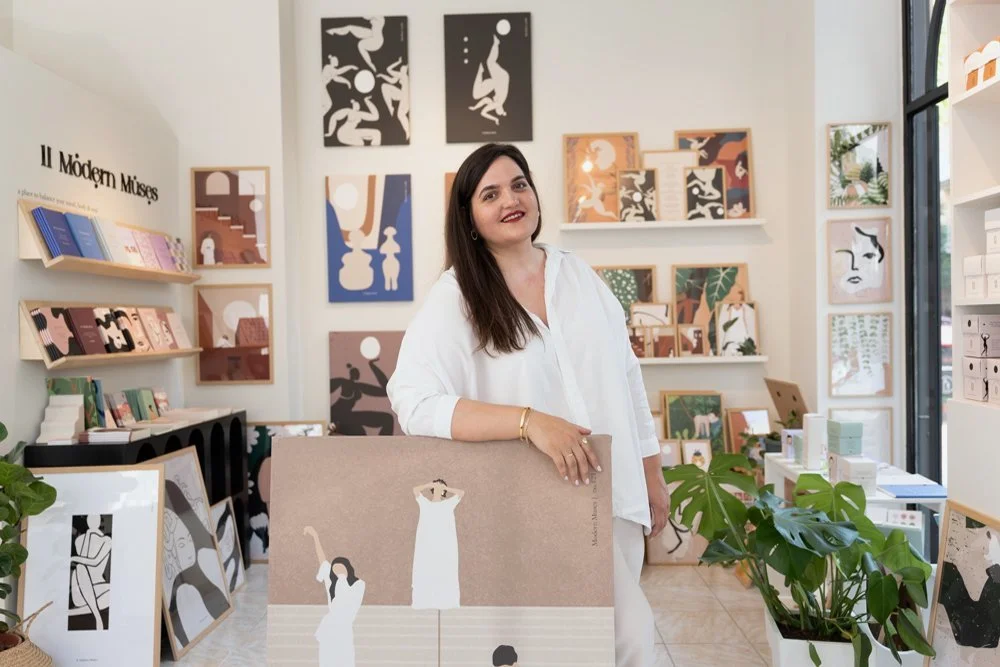INTERVIEW | Yue Zhuo
10 Questions with Yue Zhuo
Joy Yue Zhuo is a Shanghai-based object designer. After receiving her Bachelor of Fine Arts degree from the School of the Art Institute of Chicago, she continued her education and enrolled in the Master of Fine Arts program in the Furniture Design Department at the Rhode Island School of Design.
After obtaining her Master of Fine Arts degree in Furniture Design from the Rhode Island School of Design in 2020, Joy Yue Zhuo returned to Shanghai, focusing on creative endeavors in the realms of art and design. Her works have been showcased in numerous art exhibitions and design expos across the United States, including New York, Chicago, Providence, as well as internationally in cities such as Venice and Como in Italy, Mumbai and New Delhi in India, and various locations in China including Shanghai and Shenzhen. In addition, Joy was the winner of a number of art and design contests, including the Winner award at Creative Quarterly Journal 70, the Face of Peace Art Prize award by Contemporary Art Curator Magazine, and Italy A’ Design Award, Bronze Award.
Yue Zhuo - Portrait
ARTIST STATEMENT
Joy Yue Zhuo designs furniture and objects to express her utopian fantasy to the audience. She hopes users can imagine the fantasy through the interaction with her furniture and objects. While people are interacting or observing her works, they will become part of the fantasy. Joy Zhuo’s works are the NPCs (nonplayer characters) of a game she created herself called Utopian Fantasy.
Joy Yue Zhuo’s works are creature-istic, anthropomorphic, and always interactive. They are inspired by nature and everyday life. Joy’s works express her appreciation for the underwater world and the internet. Her designs beg for interaction and play. Wander around one of Joy’s pieces for a couple of seconds, test it, play with it, and through interaction, her furniture will be happy to share everything they know with you. Meanwhile, Joy loves adding surprises to her pieces, giving them a sense of humour, a point of interaction and exchange. Joy Yue Zhuo wants people to say, “ Oh, how joyful!” when interacting with her works.
Squeak Anemone Ottoman, Yoga ball, stretchy velvet, pool noodles, 50x50x65 cm, 2019 © Yue Zhuo
INTERVIEW
Let's start from the basics. Who is Joy Yue Zhuo, and how did she become an artist?
Please allow me to briefly introduce myself. My name is Yue Zhuo in Chinese, which means brilliant and cheerful. And because I believe that happiness is more important than anything else, my English name is Joy. I was born and raised in the Chinese coastal city of Fuzhou. Prior to college, I was not a good student; my academic standing was constantly near the bottom of the class, as I did not enjoy the subjects I studied: math, physics, chemistry, and literature. The only thing I enjoy doing in class is constantly doodling on my textbooks and exams. And when I told my parents that I wanted to go to an art school for college, they gave me their entire support, for which I am quite grateful. After earning a bachelor's degree in visual arts from SAIC, I attended RISD to get a master's degree in furniture design. And Voilà! I turn into an artist. As an artist and object designer, I am currently located in Shanghai, China.
What is your background and your studies? How did they help you become the artist you are today?
Since I was very young, my father and grandmother have had a significant impact on me. My grandmother would always take me into the woods and let me explore nature, and she would help me construct something out of the sticks and rocks we found. And because my father is a major design enthusiast, he purchased me numerous design books and introduced me to a multitude of design documentaries. I believe these have significantly affected who I am as an artist. I enjoy looking for creativity in everyday life and am inspired by commonplace objects. I feel that a good piece of art must be relevant to people's daily lives so that they can be attracted to and appreciate my work.
SEAt Urchin Rocking Chair, wood, sponge, 35x35x25 cm, 2020 © Yue Zhuo
SEAt Urchin Rocking Chair (detail) © Yue Zhuo
SEAt Urchin Rocking Chair (detail) © Yue Zhuo
Is there a specific moment when you realized you wanted to become an artist and designer?
Even though I already knew that I wanted to go to art school for college, I did not know what direction I wanted to take in the future until my junior year of art school. During my first two years of college, I took nearly all introductory courses in many areas, including painting and drawing, photography, illustration, interior architecture, design, and art performance. So I was apprehensive about the following step until my interior architecture seminar instructor brought us on a field trip to his friend's furniture design studio. I still recall the moment I walked into his studio, and every piece of furniture greeted me. Unlike the furniture in our original home, his creations appeared to be alive. When the owner was sitting in one of his "creatures" and talked to us about his experience as an artist, I was amazed by him. In that instant, I realized that I wanted to become a furniture designer, or more precisely, an artistic object designer.
You studied in the US and currently live and work in Shanghai. How do these different experiences and places influence your work? Did they shape how you perceive and make art?
The differences between the works I created in the United States and in Shanghai are enormous. When I created works in the United States, I was experimenting with many materials, so I attempted to incorporate as many as possible into my creations. In addition, I believe I have greater creative freedom in the United States with regard to my artistic endeavors. As a result of the entirely different political climate in Shanghai, I can sense that I have grown more circumspect about the viewpoints I wish to promote through my art. I will also evaluate the expense, as funds are limited. But there is one aspect that I believe is a double-edged blade, and that is the phenomenon of outsourcing resources in China. In other words, I can simply model the artwork I wish to create in 3D modeling software and send it to the outsourcing business, which would then bring my 3D model to life. But I consider craftsmanship to be a crucial aspect of my work; I believe that handcrafted and machine-made objects are qualitatively distinct. Even if I have access to numerous outsourcing options, I will attempt to create my artwork by myself in my shop.
Swing Ray Side Table, Sheet metal, Fish line, 30x30x27 cm, 2019 © Yue Zhuo
Jelly Fish Lamp, Glass, PVC pipe, Light bulb, 18x15x80 cm, 2020 © Yue Zhuo
Let's talk a little bit about your work. You create design pieces inspired by marine creatures. What inspired you? And how did you develop such a style?
Because I was raised in a coastal city, I am drawn to all things aquatic. I enjoy #TBT, so when I came across a reference to the children's film "Finding Nemo" on Instagram, I decided to watch it again later. After a second viewing of the film, I was intrigued by the humanistic nuances, and the qualities that might produce these beings, which were halfway between animal and human. It was as if a utopian ideal had come to life, and I concluded then that everything in this film was true. Even though invertebrates do not have faces, I felt a kinship with them because they are luminescent in the dark. With my drawings, I wanted to establish my own aquatic heaven. When furniture interacts with the human body, it comes to life. My SEAt Urchin and Squeak Anemone Rocking Chair Conversational Ottoman toys necessitate spontaneous interaction and play. For instance, when people lay their feet on Squeak Anemone, it makes a squeaking sound! The squeak is appealing, and people continue to tread on it to make it; as they play with it, their happiness and attachment to it grow.
Your statement says that your designs "beg for interaction and play." What is the role of the viewers in the activation of your works?
I create furniture and other crafts to demonstrate my utopian ideals to others. I hope that people's interactions with my furniture and products inspire them to conceive of great things. When individuals are incorporated into my works of fiction, they become an intrinsic component of the fantasy. My work is a non-player character (NPC) in a utopian dream I created. Constantly, my work is biological, humanistic, and interactive. They find their inspiration in nature and daily life. This collection demonstrates my appreciation for the internet and the ocean. My designs foster connection and playfulness. Explore one of my items for a few seconds, test it, and engage with it, and it will gladly demonstrate its knowledge. My furniture's utility develops through play while interacting with those nearby. I enjoy infusing my work with a sense of surprise, comedy, engagement, and effective communication. I want those who engage with my artwork to exclaim, "How delightful!"
What messages do you want to convey with your work?
Why must furniture be constructed as it is? Who determines its meaning? Why must a chair have four legs and a single backrest? Why can just one individual use an ottoman? Why? I despise the ordinary, and I dislike introducing restraints and limitations to my creations. I desire for my designs to be unique. The human body interacts with furniture on a daily basis. However, the majority of a home's furniture serves solely to support the body or other things. I would like my furniture to provide both support and a platform for play.
Squeak Anemone Ottoman, Yoga ball, stretchy velvet, pool noodles, 50x50x65 cm, 2019 © Yue Zhuo
Squeak Anemone Ottoman, Yoga ball, stretchy velvet, pool noodles, 50x50x65 cm, 2019 © Yue Zhuo
Is there anything else you would like to experiment with or implement in your production?
The term Metaverse is now trending; thus, I'd like to experiment with virtual furniture or AI decorations. Thus, individuals can purchase my NFT artwork and digitally place it wherever they like.
Let's now talk about the future. What are your next projects? And what are you working on at the moment?
Currently, I'm working on a new project titled "Good to have Uselessness," which will consist of a collection of artworks representing my understanding of consumerism society. Angler Fish Candle Holder is one of the works that I've already finished. It is a 3m x 2m x 1m steel structure that takes up a lot of space in the room, but its sole purpose is to hold the smallest candle available at Ikea.
Lastly, as we are beginning a new year, what are your goals for the coming months?
China ends the quarantine policy and covid travel restrictions after three years. My goal for the upcoming months is to travel abroad, primarily to the United States, to meet my artist friends and view the most recent design exhibitions.
























